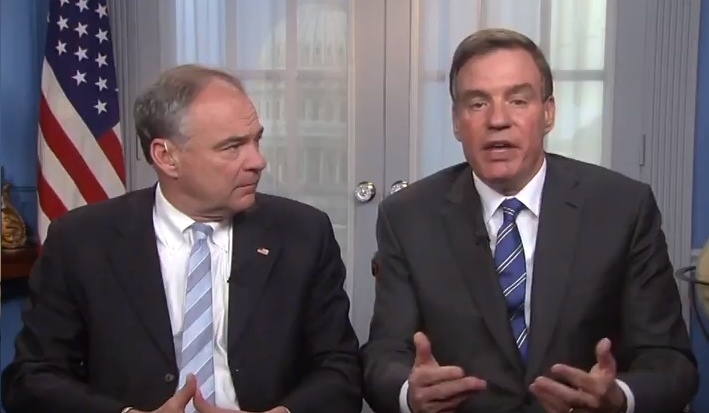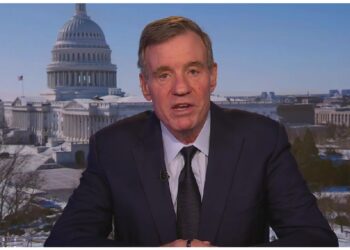See below for video of a fascinating interview with Sen. Mark Warner by the Center for American Progress yesterday, on the Murthy v. Missouri case, which Sen. Warner says “might be the most impactful Supreme Court case you haven’t heard of yet…this case could have HUGE ramifications for the future of communication between the government and Big Tech.” A few highlights from the interview include Sen. Warner saying the following:
- “In a way, I was actually surprised that other public figures didn’t weigh in more formatively. This case, which was generated by far-right attorneys general, is trying to stop the voluntary communications between the social media platforms and entities like the FBI or NSA or CISA, and in a realm where those kind of conversations in the past have always been voluntary, particularly when it comes to the questions around foreign election interference, I think it is really really troubling the implications of this case and god forbid if it would actually be upheld by the Supreme Court.”
- “This [Russian interference in the 2016 U.S. election] was not some benign effort of Russia to…float some memes or put forward some bots; it was a organized effort by the Russian spy services…to meaningfully infiltrate our system to pit Americans against Americans…It was very very powerful and I would urge people as they think about this case…and it really caught both the American government and the social media companies off guard.”
- “The real-world consequences…we’re seeing them play out right now, because after July 5th of last year, even though there was a stay put in place, there have been no communications…the voluntary communications where if we were to see a foreign malign actor trying to interfere in our elections or if Facebook were to see evidence of that kind of activity, in the past we would share that information – it made us better prepared in 2018, better prepared in 2020…unfortunately…we are now in March of 24, months away from our next national election, and I feel we are less prepared today for the 24 elections than we were at the corresponding time in the 20 elections, partially due to this case, partially due to the fact that there are a greater number of Americans who don’t trust anything in our electoral system, partially due as well to the fact that countries like Russia but also China, Iran and others have a a much higher interest in interfering in our elections…and then you have this whole new scale of tools that can be brought to bear with AI.“
- “Unfortunately, we’ve seen a company like Twitter that was fairly forward leaning on some of these issues, obviously under Musk completely retreat from the space. We’ve seen Facebook as well cut back on some of their efforts. I think the same with with Google and YouTube…”
- “I think we can catch up. But I think one of the things that’s taken place beyond the direct election interference, we have seen the whole tenor of conversation of what is kind of within the bounds of traditional politics greatly expand…it’s called expanding the Overton Window, where…often times race baited, anti Semitic kind of the things that were beyond the bounds, now the social media companies allowing more and more, oftentimes violating their own terms of service. And the…far right has bullied them into not even adhering to their own terms of service, which by people participating on their platforms were supposed to be agreeing to abide by those terms of service, and the platforms are not enforcing those. So we are behind. I think my committee and others need to do a better job of putting the public on notice, and we will be holding hearings in a public setting. I’m trying privately and publicly to force the Biden Administration to raise the focus on this; I’d like to know who in the administrations is in charge of election protection overall – I don’t think I know that right now.”
- “The AI tools which can bring this level of manipulation through deep fakes, both video and audio; we’ve already seen the voice deep fake of Biden in New Hampshire in terms of a robocall. We need an immediate response mechanism, because with AI tools, this can happen at a speed and scale that frankly I’m not sure we’re fully prepared for… The notion that we couldn’t do this or wouldn’t be able to do this on a timely and voluntary cooperation basis is just stunning to me, and again goes back to your initial question of why I filed the amicus brief. This is a big big deal, and people across the political spectrum who want our elections to maintain their independence ought to be concerned.”
- “AI tools – and we’re starting to see these already as they roll out – can have, you see something or hear something and if seeing and hearing is supposed to be the old way…we validate stuff, seeing and hearing is no longer the validation tool, because the AI tools will get so good, so quickly that if there’s not that watermarking that indicates to a consumer, no this is altered content, you could have real chaos.”
- “When the courts get so far out of the mainstream…when the political debate goes so far out of the mainstream…that is a a cauldron of pretty potent forces.”
- “The Supreme Court in particular, at the end of the day, as a non-elected body, has to rely on trust that it’s going to play down the middle, that it’s going to be fair and impartial. And taking what had been settled…around the right to choose and overthrowing that with the Dobbs decision, I think went a bit to the heart of that trust. On top of that, the fact that the court has failed to put in place a set of ethics requirements...some of the reports at least about Judge Thomas’s level of of gifts and favors received…I think the court needs to be self-aware enough that each of these actions all become cumulative when you add them all together. And it undermines the trust the people have in the court. There have been conservative courts, there have been liberal courts, and you could argue in many ways we’ve had a conservative court almost since President President Reagan. But it still had legitimacy. But when it goes beyond, when it throws out a Roe v Wade with the Dobbs decision, when it has members of the Court appearing to take gifts that don’t pass the smell test, when you’ve got a justice in Justice Thomas, who at least appears is willing to recuse himself on some of the cases involving President Trump’s efforts to overthrow the 2020 elections, when it appears again fairly obvious that his wife was actively engaged in those activities, that the cumulative effect of all that I think really undermines the Court’s legitimacy in many ways. And I think that is bad news, because when that trust is lost, it can’t be replaced overnight; even if the the court suddenly became less conservative and became more moderate…once you lose this kind of faith, it is a currency that cannot be quickly restored.”






![Sunday News: “Trump Is Briefed on Options for Striking Iran as Protests Continue”; “Trump and Vance Are Fanning the Flames. Again”; “Shooting death of [Renee Good] matters to all of us”; “Fascism or freedom? The choice is yours”](https://bluevirginia.us/wp-content/uploads/2026/01/montage011126.jpg)











